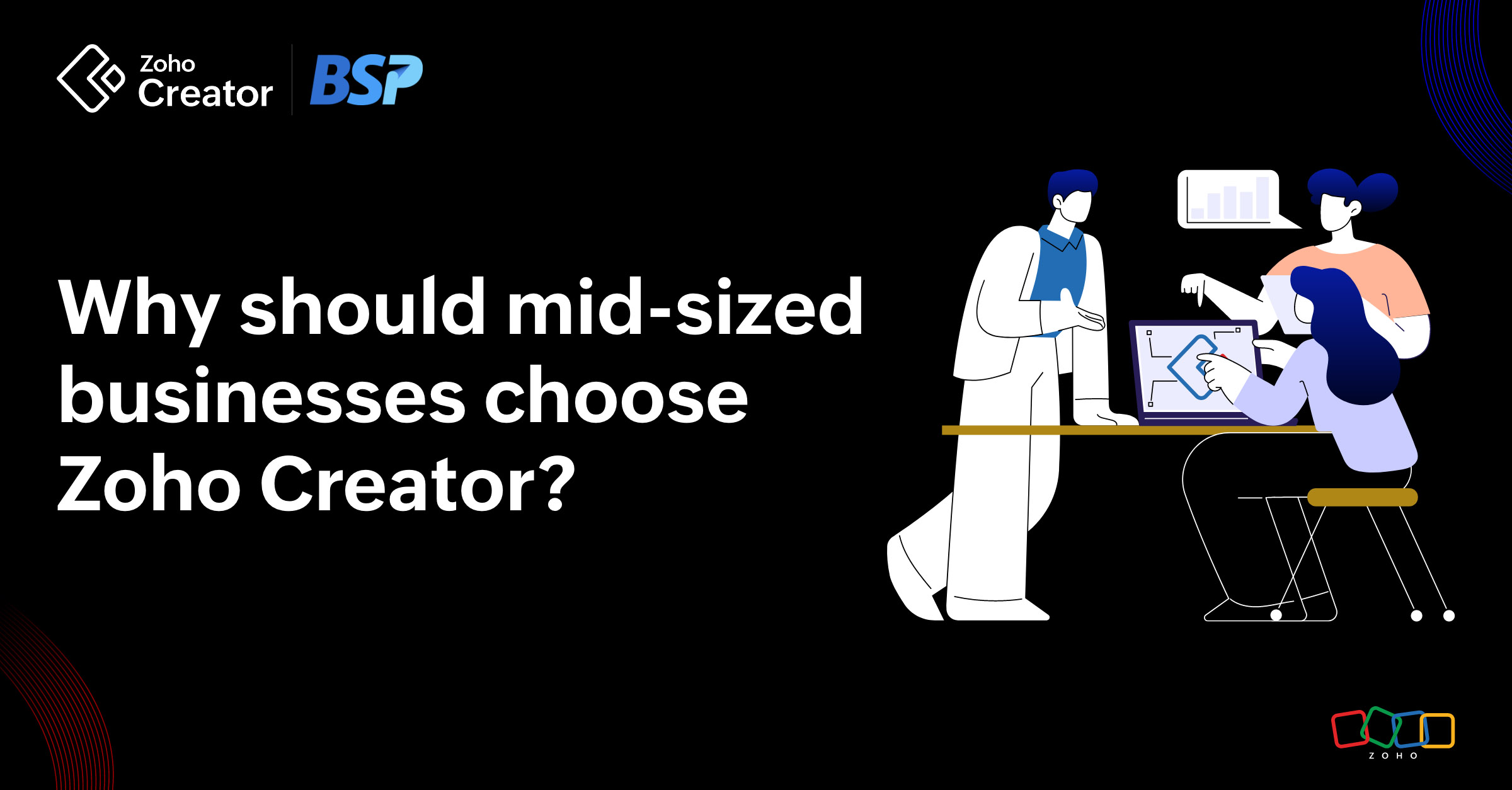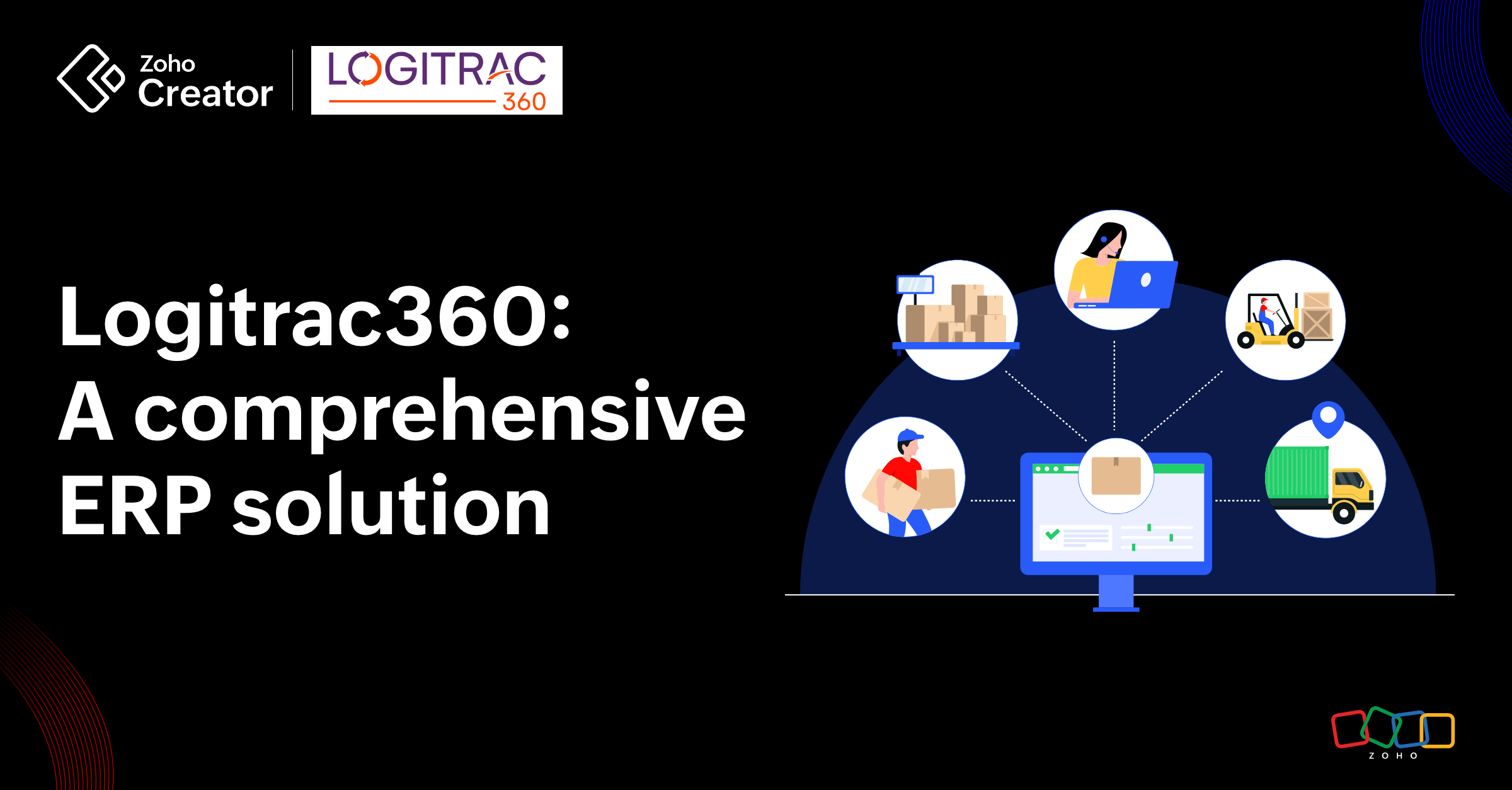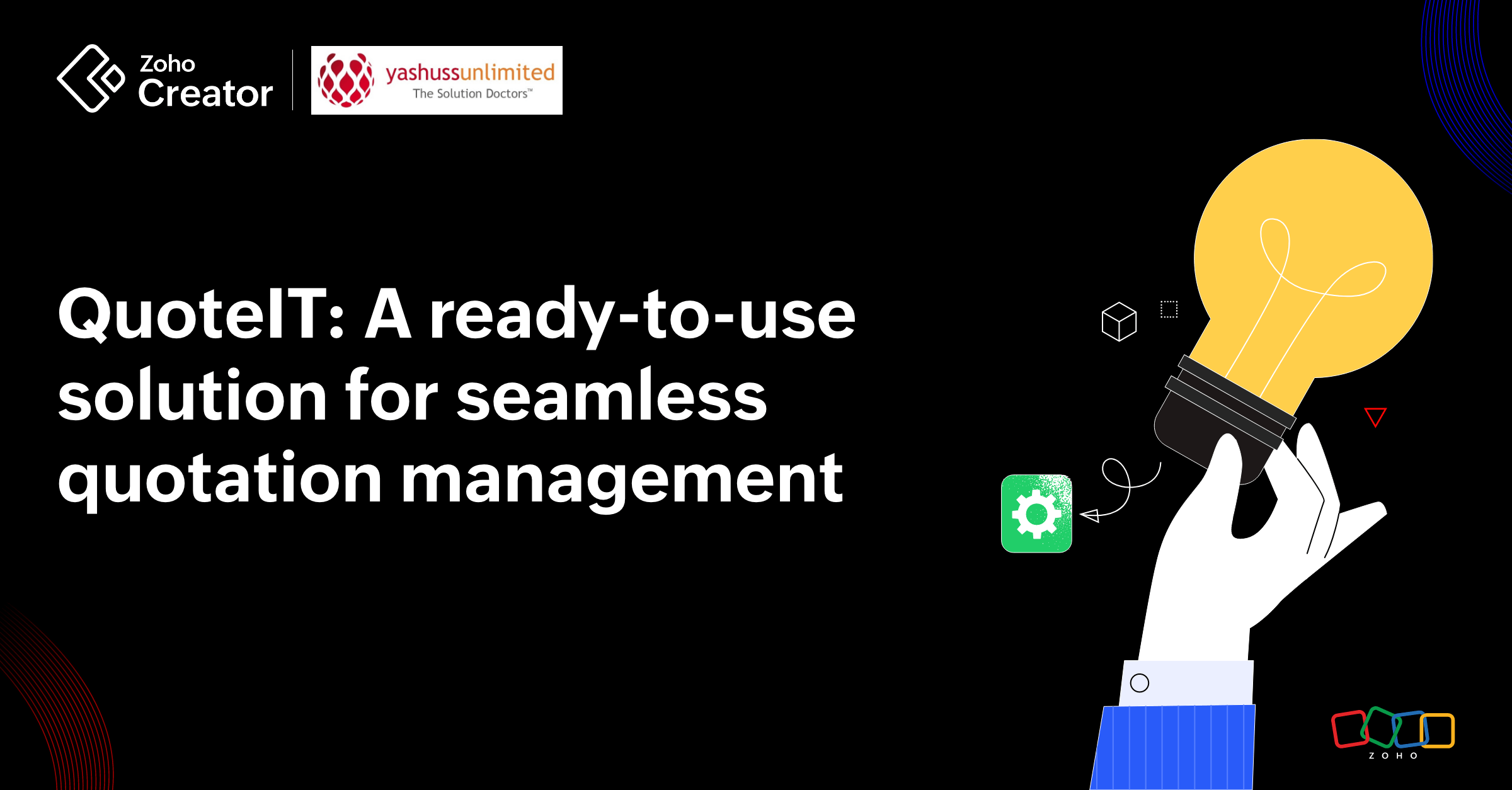- HOME
- Create Your Way
- 10 common misconceptions about low-code—and why Zoho Creator is unique
10 common misconceptions about low-code—and why Zoho Creator is unique
- Last Updated : April 20, 2023
- 1.1K Views
- 8 Min Read

Low-code is a software development approach that relies predominately on visual components, such as drag-and-drop, to build applications and hasten digital transformation journeys. In contrast to traditional application development, low-code enables even citizen developers to build applications from the ground up, with little to no coding. With their intuitive visual builders, ready-to-use code snippets, reusable components, and other tools, low-code platforms enable us to design custom solutions, automate workflows, and deliver apps faster.
“While low-code application development is not new, a confluence of digital disruptions, hyperautomation and the rise of composable business has led to an influx of tools and rising demand,” said Fabrizio Biscotti, research vice president at Gartner.
According to Gartner, "By 2024, low-code application development will be responsible for more than 65% of application development activity ." Since 2020, more and more businesses have been making the shift online. Not only is digital transformation propelling the adoption of low-code platforms, but there are also other factors contributing to the adoption, such as rapid application development (RAD), faster delivery time, flexibility, and scalability. Another significant aspect is that low-code platforms are versatile in nature, since they have prebuilt data modules that can be used right away.
Using low-code platforms can result in increased efficiency and a better overall end-user experience. And the growing need for custom software solutions to accelerate digital transformation has spurred the growth of citizen developers outside of IT, which has fostered the rise of low-code platforms even further.
Impact of low-code
Low-code platforms are being embraced by a broad spectrum of industries, from retail to healthcare, and by organizations of all sizes, regardless of role or vertical. Organizations recognize they can be even more successful with their digital transformations if they eliminate hand coding entirely, instead implementing low-code across their organizations.
Some of the advantages of low-code:
Cost-effective
Enhances agility
Faster transformation
Modernization of legacy systems
Low upkeep costs
Rapid integration
A low-code development platform can be especially useful in enabling different teams to build applications faster and with fewer resources, as well as to implement faster go-to-market strategies.
Low-code platforms are fast becoming the go-to solution for every industry, especially during the pandemic. In the manufacturing sector, for example, manual and labor-intensive tasks are predominant, affecting productivity and efficiency.
Manufacturers have a digital opportunity to achieve operational success and meet the needs of their customers more rapidly and effortlessly with low-code development. They can use custom ERP software to automate and digitize their entire process, from inventory monitoring to distribution management. Similarly, when the education industry was forced to go completely digital, educational institutions embarked on a much-needed digital transition.
Low-code platforms can help schools and universities quickly create custom education software from the ground up, with little or no code. Separate portals for all stakeholders, including students, parents, and administration, can be created, and everything from admissions to grading can be managed in one place.
Low-code platforms are here to stay, and leveraging them may provide several benefits that should not be overlooked. There are several misconceptions about low-code platforms. Continue reading to see how Zoho Creator debunks these common misconceptions.
10 common misconceptions about low-code platform—and the reality
Myth 1: Low-code platforms will limit the scope of your implementations
One of the most common misconceptions about low-code platforms is that they're too modular and cannot be customized beyond a point. Low-code development promotes the idea of achieving as much as possible without code, and as a result, software engineers are believed to be unable to extend functionality with the code they desire.
Reality: The Zoho Creator platform adapts and grows with your requirements. It has built-in auto-scaling features that allow it to adapt to the growth needs of any business. Creator also provide generous room for customization on the platform, both on the front end—you can tweak the UI to your liking using HTML and ZML scripts—and when manipulating workflows using JavaScript or our own scripting language, Deluge. In addition to this, you can keep adding new features and capabilities to the platform regularly. To reduce time to market, you can also use prebuilt reusable components, templates, and integrations.
Myth 2: Debugging low-code apps is hard because they're opaque in nature
Reality: Zoho Creator provides extensive logging functionalities that record every success and failure, in addition to logging scripting actions, with a record of the timestamp and the user. This level of transparency can be used for debugging and bringing in any desired logic changes required for the application. The platform also supports record audits, that help in tracking every change that's made in the production application, for each record made by each user.
Myth 3: Low-code apps are bloated and inefficient
There is a popular misconception that low-code causes bloat to your storage and codebase, causing your app to slow down and/or hinder you from dealing with massive datasets. Low-code apps are frequently seen as black boxes of bugs and issues.
Reality: The Creator platform abstracts all areas of the app building process—from building UI to creating dashboards to automating workflows—by breaking down complex concepts to simple configurations. This reduces the design errors that a developer can make, acting as guardrails to development. The performance of your applications can also be audited periodically using this platform.
Myth 4: Proprietary low-code tools have a steep learning curve
Another common misconception is that using a new tool takes a significant amount of time and effort to become acquainted with, which may result in a delay in implementation.
Reality: Zoho Creator is built with simplicity as its core theme. From the intuitive drag-and-drop UI builders for forms, reports, and dashboards to guided workflow script builders, the main focus is on making users' lives easy when it comes to developing applications. This naturally reduces the learning curve on the Creator platform, and makes it possible to get a live application developed from scratch, in a fraction of the time that you'd spend on traditional development methods. Creator also supports coding extensions in other languages, such as JavaScript, Node.js, and Java, based on your preferences.
Myth 5: Low-code is not true to its name, and involves heavy coding
Some people feel that low-code platforms can only be utilized by developers since they require extensive coding skills.
Reality: The Creator platform reduces the need for extensive coding thanks to our scripting language, Deluge. With its English-like syntax and simple scripting style, a lot can be achieved without the necessity for scripting hundreds or thousands of lines of code. For complex workflows, scripting is made easier with auto-complete, drag-and-drop code builders, and a lot more features. We're also in the process of coming up with a pool of resources for prebuilt scripts that can be directly used in applications.
Myth 6: Complex requirements can't be met with visual development
One of the most prevalent misconceptions about low-code is that it cannot be used to create complex or essential applications.
Reality: When it comes to creating apps, low-code platforms provide a competitive advantage over traditional software development for organizations of all sizes. The apps produced using Zoho Creator may be used throughout the whole organization and are comprehensive. Scaling up is possible and predominantly aids in meeting rising demand. Zoho Creator's visual development tools can tackle the speed of development without compromising on the scope or complexity of requirements. For instance, the visual process builder allows for the quick building of complex business processes, and if the developer makes changes to the process based on user feedback, that can be achieved with ease, too. Organizations can also harness the power of BI to improve decision-making and uncover strategic opportunities. Easy-to-interpret visualizations enable companies to make informed business decisions faster.
Myth 7: Low-code platforms lock in user data
Reality: The Zoho Creator platform doesn't lock customer metadata or production data. Data from the Creator platform can be exported by users at any point in time, in various file formats. The meta data of the application can also be exported in .ds format, and can be migrated to different service providers.
Myth 8: Low-code platforms are difficult to integrate with existing systems
Due to limitations inherent to low-code platforms, it isn't feasible to integrate with varied systems.
Reality: The Zoho Creator platform is built with the sole intent of working seamlessly with customers' existing systems. The platform even supports several built-in integrations on the platform itself. It also provides webhooks, where any third-party REST API can be invoked and connected, and works with vendors to provide adapters, in case a specific requirement arises.
Myth 9: Low-code makes a developer's work insignificant
Low-code platforms reduce the need for coding, and many believe that the low-code movement will eventually eliminate the work of developers, as it doesn't require coding or programming professionals. This is one of the most common misconceptions—that developers can be replaced for the benefit of the organization.
Reality: For a developer who is adept with traditional programming languages, low-code is an ally, since it drastically reduces the time-to-market of apps, thereby letting developers achieve more by doing less. It also lets citizen developers who don't have technical expertise build less complex apps, thereby letting pro developers focus on heavier apps.
Myth 10: Data privacy and security is a concern with low-code systems
Reality: Zoho Creator uses the cloud to store data safely, with a set of concepts, processes, and solutions designed to manage and secure user data. It guarantees that one customer's data is logically separated from another, as well as stored and backed up in a secure manner. Creator is also ISO certified, SOC2 and GDPR compliant, and the platform provides the greatest level of security, to ensure that data is safeguarded, validated, and backed up on a regular basis.
Low-code platforms: The future and beyond
Since COVID-19, there has been a considerable spike in the adoption of low-code platforms. This can be attributed to the fact that businesses required something that would accelerate their digitization while also allowing them to go to market faster. Low-code platforms are no longer a foreign concept, as more and more businesses of different sizes have started to embrace them.
Unlike the common notion, low-code platforms are more than just app building platforms. They not only aid businesses in their digital transition, but also boost productivity, customization, legacy modernization, and more.
While low-code platforms have already paved the way for many businesses to digitize and automate their processes, the low-code approach still has a long way to go, since there is a lot of untapped potential. Do low-code platforms reduce or eliminate the need for software developers? Absolutely not. Low-code platforms can help traditional developers improve collaboration, flexibility, and efficiency.
Build your own solution from scratch, hassle-free, using Zoho Creator. From digital transformation to legacy modernization to workflow automation, Zoho Creator has every use case covered. Still apprehensive? Get started with our 15-day free trial today.
 Aishwarya
AishwaryaAishwarya is a content marketer at Zoho. Apart from creating content, she loves to read and watch sci-fi and crime thrillers, travel, and basically can't survive without coffee.



